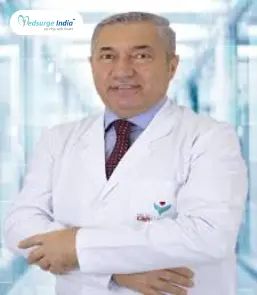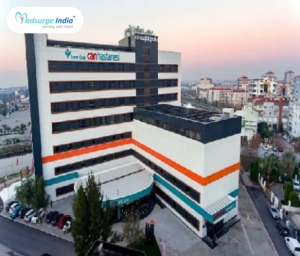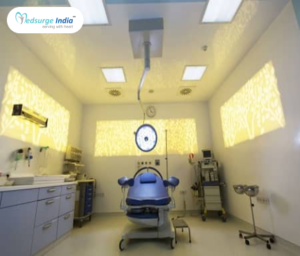Spina Bifida Treatment Cost in Turkey
Unlock Exclusive Discount : Your Gateway to Premium Healthcare with Medsurge India Health Value Card.

Unlock Exclusive Discount : Your Gateway to Premium Healthcare with Medsurge India Health Value Card.


Spina bifida is a medical condition resulting from improper formation of the spine and spinal cord. It is classified as a neural tube defect. The neural tube is the embryonic structure that eventually develops into the brain, spinal cord, and surrounding tissues of the fetus.
In this page, we will discuss the cost of spina bifida treatment in Turkey and the various factors that can affect its cost.
Spina bifida treatment cost in Turkey typically ranges from 12,000 USD to 25,000 USD. The price usually covers necessary preoperative tests, the treatment itself, and doctor consultations.
Spina Bifida Treatment cost in Turkey is generally more cost-effective compared to many other nations; however, the overall expenses can fluctuate based on several key factors:
Spina bifida is a type of neural tube defect characterized by the incomplete closure of the spinal column before birth. It falls under the category of neural tube disorders. The neural tube is the structure that eventually develops into the brain, spinal cord, and the protective tissues surrounding it.
Typically, the neural tube forms early in pregnancy and is expected to close by the fourth week. In cases of spina bifida, similar to anencephaly, a segment of the neural tube fails to close or develop correctly at some point during fetal development, leading to complications affecting the spinal nerves and vertebrae.
The severity of spina bifida can vary, ranging from a minor opening in the spinal cord and coccyx area to more severe forms that can cause significant spasticity in the legs, as well as bowel and bladder issues. In some instances, early intervention, such as surgical procedures, may be necessary to manage the condition, although it may not always be completely resolvable.
There are various forms of spina bifida, which include:
Spina bifida is frequently identified before birth, although some instances may only be recognized after delivery, particularly in cases of milder forms. The typical diagnostic methods employed by healthcare professionals include:
In cases where spina bifida is not detected prenatally, it may be identified through observable signs or symptoms, which can include:
Spina bifida occulta represents the least severe form and typically presents no symptoms. It is often discovered incidentally during an X-ray or MRI conducted for other medical reasons.
Timely diagnosis is crucial for effective treatment planning, particularly in more severe cases. In Turkey, numerous hospitals employ advanced imaging technologies and prenatal screening methods to facilitate early and precise diagnosis of spina bifida.
Spina bifida can be addressed through surgical intervention either while the fetus is still in the womb or shortly after birth.
The postnatal procedure for spina bifida is performed after the baby is delivered, typically through a cesarean section at 37 weeks of gestation, following careful monitoring of the pregnancy.
In many cases, surgery for spina bifida is carried out within 24 to 48 hours after the baby is born. The child will receive general anesthesia for the procedure. If a myelomeningocele (MMC) sac is present, a pediatric neurosurgeon will remove it during the operation. The surgeon will then close the opening by suturing the remaining tissue and skin to protect the spine. After the surgery, the infant is transferred to the Neonatal/Pediatric Intensive Care Unit (N/IICU) for further care.
Also Read:- Spina Bifida Treatment Cost in India
Prenatal spina bifida surgery is a procedure performed during pregnancy to address an opening in the spine and other related structures and tissues of the fetus. This preventive surgery for myelomeningocele (MMC) is crucial as it helps mitigate further spinal cord damage that can occur during gestation.
Opting for prenatal repair is generally more advantageous than postnatal repair, often yielding favorable outcomes from the intervention.
This procedure aids in preventing the need for ventricular shunting by reducing the accumulation of fluid in the brain. It also diminishes the likelihood and severity of neurological complications affecting motor and sensory functions in the lower limbs. As a result, it improves mobility and increases the chances of the child achieving independent walking. Additionally, it addresses the anterior brain herniation associated with Arnold Chiari II malformation.
Also Read:- Top Neurologists in Turkey
Medsurge India is a trusted medical tourism facilitator that connects international patients with top hospitals and specialists across India. With a strong network of hospitals and doctors, Medsurge India ensures high-quality, affordable treatment options tailored to each patient’s needs. The team offers complete support throughout the medical journey, including treatment planning, visa assistance, airport transfers, accommodation, and follow-up care. Patients choose Medsurge India for its personalized service, cost-effective packages, and commitment to making healthcare in India accessible, safe, and stress-free.
A: Yes, children with spina bifida can lead fulfilling lives. Approximately 90% of infants diagnosed with spina bifida reach adulthood, 80% have average IQ levels, and 75% engage in sports and other recreational activities.
A: Folic acid can be found in foods such as eggs, orange juice, and dark green leafy vegetables.
A: The neural tube is an embryonic structure that develops into the brain, spinal cord, and surrounding tissues of a baby. This structure typically forms early in pregnancy and closes by the 28th day after conception.
A: The primary goal of treating spina bifida is to enable individuals to maintain a lifestyle where their condition minimally interferes with their daily activities.
A: Women of childbearing age can significantly reduce the risk of spina bifida by taking folic acid daily before conception and throughout the first trimester. It is essential to start folic acid supplementation prior to pregnancy, as many women may not realize they are pregnant until four to five weeks in. This proactive measure offers the best protection for the developing fetus.


Neurologist
Consultant
27 years of experience
Batigoz Eye Hospital Balcova
View Doctor
Neurosurgeon
Consultant
30 years of experience
Derindere Hospital, Istanbul
View Doctor
Neurosurgeon
Consultant
18 years of experience
Derindere Hospital, Istanbul
View Doctor
Neurologist
Consultant
7 years of experience
NPISTANBUL Brain Hospital
View Doctor
Neurologist
Consultant
14 years of experience
Kolan International Hospital, Istanbul
View DoctorNeurologist
Consultant
11 years of experience
Kolan International Hospital, Istanbul
View DoctorNeurosurgeon
Consultant
12 years of experience
Kolan International Hospital, Istanbul
View DoctorNeurologist
Consultant
11 years of experience
Medicana International Istanbul
View DoctorNeurologist
Consultant
12 years of experience
Medicana International Istanbul
View Doctor









By using our site, you agree to our Terms and Conditions, Privacy Policy and Refund Policy. Medsurge India provides reliable healthcare information and treatment options to support informed decision-making. Our content is designed to support and complement the guidance of your treating doctor, helping you feel informed and confident throughout your healthcare journey. We also Accept International Payments.

Copyright © 2025 NSM ONLINE SOLUTIONS PRIVATE LIMITED. All rights reserved.